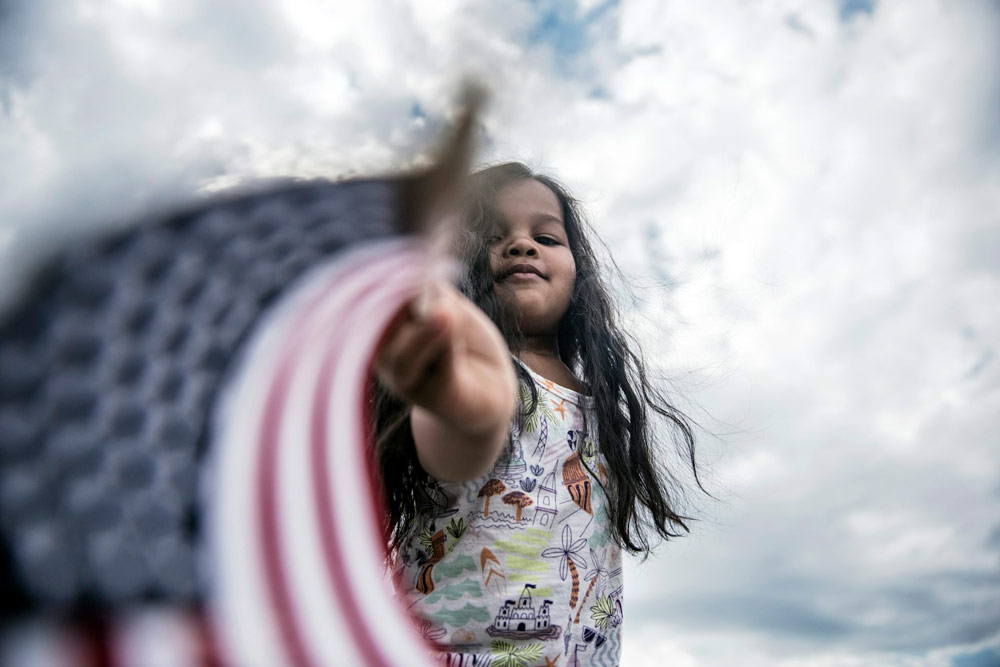
By Katherine Kinzler
In the U.S. and elsewhere, nationality tends to be defined by a set of legal parameters. This may involve birthplace, parental citizenship or procedures for naturalization.
Yet in many Americans’ minds these objective notions of citizenship are a little fuzzy, as social and developmental psychologists like me have documented. Psychologically, some people may just seem a little more American than others, based on factors such as race, ethnicity or language.
Reinforced by identity politics, this results in different ideas about who is welcome, who is tolerated and who is made to not feel welcome at all.
How race affects who belongs
Many people who explicitly endorse egalitarian ideals, such as the notion that all Americans are deserving of the rights of citizenship regardless of race, still implicitly harbor prejudices over who’s “really” American.
In a classic 2005 study, American adults across racial groups were fastest to associate the concept of “American” with white people. White, Black and Asian American adults were asked whether they endorse equality for all citizens. They were then presented with an implicit association test in which participants matched different faces with the categories “American” or “foreign.” They were told that every face was a U.S. citizen.
White and Asian participants responded most quickly in matching the white faces with “American,” even when they initially expressed egalitarian values. Black Americans implicitly saw Black and white faces as equally American – though they too implicitly viewed Asian faces as being less American.
Similarly, in a 2010 study, several groups of American adults implicitly considered British actress Kate Winslet to be more American than U.S.-born Lucy Liu – even though they were aware of their actual nationalities.
Importantly, the development of prejudice can even include feelings that disadvantage one’s own group. This can be seen when Asian Americans who took part in the studies found white faces to be more American than Asian faces. A related 2010 study found that Hispanic participants were also more likely to associate whiteness with “Americanness.”

AP Photo
Language and nationality
These biased views of nationality begin at a young age – and spoken language can often be a primary identifier of who is in which group, as I show in my book “How You Say It.”
Although the U.S. traditionally has not had a national language, many Americans feel that English is critical to being a “true American.” And the president recently released an executive order claiming to designate English as the official language.
In a 2017 study conducted by my research team and led by psychologist Jasmine DeJesus, we gave children a simple task: After viewing a series of faces that varied in skin color and listening to those people speak, children were asked to guess their nationality. The faces were either white- or Asian-looking and spoke either English or Korean. “Is this person American or Korean?” we asked.
We recruited three groups of children for the study: white American children who spoke only English, children in South Korea who spoke only Korean, and Korean American children who spoke both languages. The ages of the children were either 5-6 or 9-10.
The vast majority of the younger monolingual children identified nationality with language, describing English speakers as American and Korean speakers as Korean – even though both groups were divided equally between people who looked white or Asian.
As for the younger bilingual children, they had parents whose first language was Korean, not English, and who lived in the United States. Yet, just like the monolingual children, they thought that the English speakers, and not the Korean speakers, were the Americans.
As they age, however, children increasingly view racial characteristics as an integral part of nationality. By the age of 9, we found that children were considering the white English speakers to be the most American, compared with Korean speakers who looked white or English speakers who looked Asian.
Interestingly, this impact was more pronounced in the older children we recruited in South Korea.
Deep roots
So it seems that for children and adults alike, assessments of what it means to be American hinge on certain traits that have nothing to do with the actual legal requirements for citizenship. Neither whiteness nor fluency in English is a requirement to become American.
And this bias has consequences. Research has found that the degree to which people link whiteness with Americanness is related to their discriminatory behaviors in hiring or questioning others’ loyalty.
That we find these biases in children does not mean they are in any way absolute. We know that children begin to pick up on these types of biased cultural cues and values at a young age. It does mean, however, that these biases have deep roots in our psychology.
Understanding that biases exist may make it easier to correct them. So Americans celebrating the Fourth of July perhaps should ponder what it means to be an American – and whether social biases distort your beliefs about who belongs.
![]()
Katherine Kinzler is Professor of Psychology at the University of Chicago.





























Pogo says
@More limousine Liberal pedantry
…from the balcony of an ivory tower.
SMH here in hell’s basement; while the sewer rises, the rats and roaches cheer — and the air disappears.
Jake from state farm says
You put way to many words here offering excuses and bias. Yes there are those who are racist or have some bleeding heart feelings of what it means to be an American but simply put any America believes an American is someone who believes in the ideals of liberty, equality, and justice — who stands for the promise that every individual, no matter their background, has the right to pursue a better life. Being an American means cherishing freedom, honoring the sacrifices of those who came before, and striving to build a more perfect union through courage, hard work, and compassion. It is not just a matter of birthplace or citizenship, but of shared values: a belief in democracy, a respect for the rule of law, and a commitment to the ongoing experiment of a nation built on the principle that all are created equal. Happy 4th of July and God Bless the United States of America.
Ray W, says
Multiple news outlets report that on June 20th 71-year-old Rick Taylor, a long-time political consultant based in Los Angeles, was detained by a Customs & Border Protection agent at an airport as he returned from a family vacation to the Turks and Caicos Islands.
Per his account, as the Customs agent looked at his U.S. passport, the agent suddenly stopped and asked if he was from California. He replied that he was from Los Angeles.
The agent then placed an orange sticker on his passport and told him to follow the “green dots” to a detention room where he was held for nearly an hour without explanation of why he was being detained.
Upon release, he was told to have his suitcase inspected. His wife had already retrieved it from a luggage conveyor; it was then sent through a scanner without being opened.
Upon release, he did not ask why he had been detained, as he just wanted to get away from the site.
An L.A. Times reporter was later told by a CBP representative that if Mr. Taylor wanted to find out why he had been detained he could file an online complaint with the agency. The reporter was also that “CBP Officers are not obligated to provide a reasoning for temporarily detaining a traveler.”
Make of this what you will.
BillC says
It seems some people haven’t heard of Trump’s executive order banning DEI across the board in government, corporations, schools, gender and sexual identity. Trump’s Jan. 20 order, issued on his first day back in office, criticized DEI as “illegal and immoral,” while the following day a memo from the U.S. Office of Personnel Management called for all federal DEI employees to be placed on leave. Roughly half the country voted for Trump and by extension, his policies. btw, DEI stands for Diversity, Equity and Inclusion, or to put it another way, standing “for the promise that every individual, no matter their background, has the right to pursue a better life”.
BillC says
PS Let’s not forget about the push to erase Black History by banning books from schools and libraries, such as books by the Nobel Prize winning author Toni Morrison, and her Pulitzer Prize winning novel “Beloved”.
Oh, how white people have been discriminated against throughout US history!
R.S. says
Really, Mr. Jake from State Farm? “Shared values: a belief in democracy, a respect for the rule of law, and a commitment to the ongoing experiment of a nation built on the principle that all are created equal.” Wow! Are you ready to excommunicate and deport the Trump clan?
Atwp says
What is American? Is it White folks owning most of the country and trying to take what little people of color have? Is it White women calling authorities on Black men say the Black men fit the description, we look suspicious, and they the White women are uncomfortable. Is it that White Male cops kill Black Men and get little to no punishment? Is it passing a spending bill that will add trillions to the deficit, cut social spending, give white billionaires huge tax cuts, hurting the poor, causing millions to lose health insurance? Is it young Black Men committing crimes and being punished like serial killers? Is it causing an insurrection and being pardoned, even though some people lost their lives? Most of the insurrection were caused by white men.Is it Black Men not doing what they should to make a good living for their families? Is it White People have it so easy they don’t know what hardship is? Is it that People of color have it so hard they think the good life is an illusion for themselves? Is it that this country is trying to immobilize me, so I can’t reach my highest accomplishment? Is it black on black crime? Is it that American mean, loud mouth liars, murderous society, theiving raping don’t care people? Is it getting rid of African American studies, pretending slavery was a lie and this country is perfect? What is American, all the above and a whole lot of negative stuff.
Atwp says
Being American is being human. Liars, stealers, back biters, lynchers, rapers, murderous, deniers, opting for the wrong people. Being American could mean, helping folks, caring for folks, doing what is right toward other people. What does American really mean?